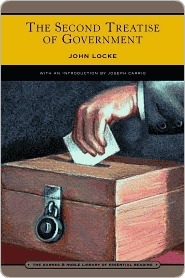4 of 5 stars ****
John Locke is a most fundamental influence on the United States of America's foundation. His worldview, logical mind, and sense of justice for men and women in society pave the way for our founding fathers. The reading can be challenging because of his style but the gist is clear once read.
Locke introduces the reader to the reasoning behind the choices one makes in becoming a member of society. All societies differ in many ways but the source of power in a society may be abusive to its people or unfair in its attempt to maintain power.
Locke then proceeds to suggest something rare; a society that is for the people who live and work within its laws in a harmonious fashion. He is a proponent of an individual's right to property, fair judgment, and protection of his life from anyone or anything that tries to impose their will over his to further their own power. He believes that a commoner should yield to an authority when authority is legislating from a mutual understanding that protects everyone. Locke also points out that if the authority forces its power over a commoner for personal gain, then the righteous one is the commoner and is justified in rebelling against such authority.
Locke's Second Treatise of Government concludes that any power given up to authorities who remain in power and arrange for successors to their political positions cause the people, communities, and commonwealth to forfeit their power. For this reason, temporary positions of power allow a society to right itself once it diverts from its original course because the people can make the corrections as they see fit.
3 of 5 stars ***
Sex in the City or trashy romance novel? I do not know; I am not real familiar with either. I first listen to the sample portion of this audiobook after bypassing the option several times. I laugh and liken it to 50 Shades of Grey. Something about the psyche of a woman spoken in a male locker room vernacular amuses me.
I want to read or listen to a variety of literature that is contemporary as well as historical, instructive and entertaining. Lingus is a novel about the sexual freedom in today's world that offers a woman's honest perspective about sex and dating in these times of instant gratification via cyberspace porn. Mariana Zapata writes well to hold my attention but I am probably not her target audience. I am curious why so many smart, lovely women like to read "trashy romance novels," as they inform me of their reading preference. I know that genre is the most lucrative of genres.
Lingus may be an example of such a story as it centers around one middle class 25-year-old female who thinks she is pretty but not gorgeous. Her fantasy lover meets her in the most inappropriate place while she is picking her underpants out of her butt cheeks. He is every woman's dream who finds her to be the answer to his desires. The rest of the story goes from one relational development to another defining their true feelings for one another.
I look at this book as a reflection on a certain segment of society that is uninhibited by moral, Victorian standards that would have this book banned related to its descriptive intimate moments. Lingus is not literature for one's self-improvement but rather a testament to mankind's lust for the flesh and the world. The author is honest in her writing and shocking in her blatancy. One can understand what compels a writer to compose such literature, sex sells.

